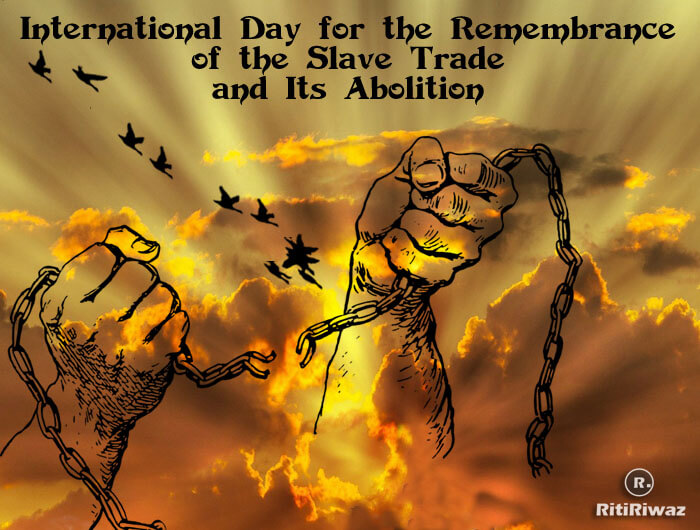International Day for the Remembrance of the Slave Trade and Its Abolition

International Day for the Remembrance of the Slave Trade and Its Abolition is an international day observed on 23 August every year. A day designated by United Nations (UN) to remind people of the tragedy of the transatlantic slave trade. The day is an opportunity for all of us to reflect on the tragedy of slavery and the slave trade and gives people a chance to think about the historic causes, the methods, and the consequences of the slave trade.
Being traded and treated as a slave is the worst humiliation one can imagine, and the slave trade is one of the most heinous crimes the world is still trying to eradicate. Every human is bestowed with humanity from the moment of their birth. But it is in the human nature of some to try to prevent people from pursuing their interests, resulting in heinous acts committed against innocent people.
The United Nations Educational, Scientific, and Cultural Organization (UNESCO) proclaimed August 23 as such in order to remind people of the tragedy of the slave trade and give people a possibility to learn about the history and consequences of the slave trade.
International Day for the Remembrance of the Slave Trade and its Abolition is among several UN observances which commemorate the Transatlantic slave trade, which lasted for over 400 years (between roughly 1500 and 1870), its enduring consequences, and the role of slaves in abolition.
August 23 marks the first day of the Haitian Revolution after the revolt began on the night of August 21, 1791, as a tropical storm swept over the island of Saint Domingue (now known as Haiti). Inspired by the French Revolution, Haitian slaves finally revolted. People were shocked by the Revolution’s violence without acknowledging their own hand in it. It took more than a decade of terrible violence with many twists and turns, but the Haitian Revolution was the first slave revolt to create a free and independent state.
International Slavery Museum
The International Slavery Museum opened in August 2007 and aims to increase the understanding of transatlantic, chattel, and other forms of enslavement. It is the only national museum in the world to cover the transatlantic slave trade and its legacies as well as contemporary forms of slavery and enslavement. As an international hub for resources on human rights issues and campaigning, the museum aims to educate people on the history of slavery and how it still has an effect on modern-day life.
Suggested Read: International Day for the Abolition of Slavery
How the day is celebrated
International Day for the Remembrance of the Slave Trade and its Abolition was first celebrated in a number of countries, in particular in Haiti (23 August 1998) and Goree in Senegal (23 August 1999). Cultural events and debates too were organized.
Each year, the UN encourages educators, artists, teachers, and students to organize events regarding this day. People show their resistance against slavery through their artworks, music, theatre plays, dances, and drama. Theatre companies, cultural organizations, musicians, and artists take part in this day by expressing their resistance against slavery through performances.
Teachers and educators share knowledge informing people about the historical events associated with the slave trade, the consequences of the slave trade, and promoting tolerance and human rights. Non-governmental organizations, government agencies, and youth associations are also actively involved in these activities in order to educate public about the slavery and its negative consequences.
Various programs are held on this day
- Lectures
- Conversations
- Panel discussions
- New resources for exploring the past and its impact on the present
- Creative activities
We are now in the 21st century; we can stand together to eliminate all forms of modern slavery and enshrine the principles of freedom and human rights.
No to slavery and Yes to freedom! Suggested Read: Important Days In August